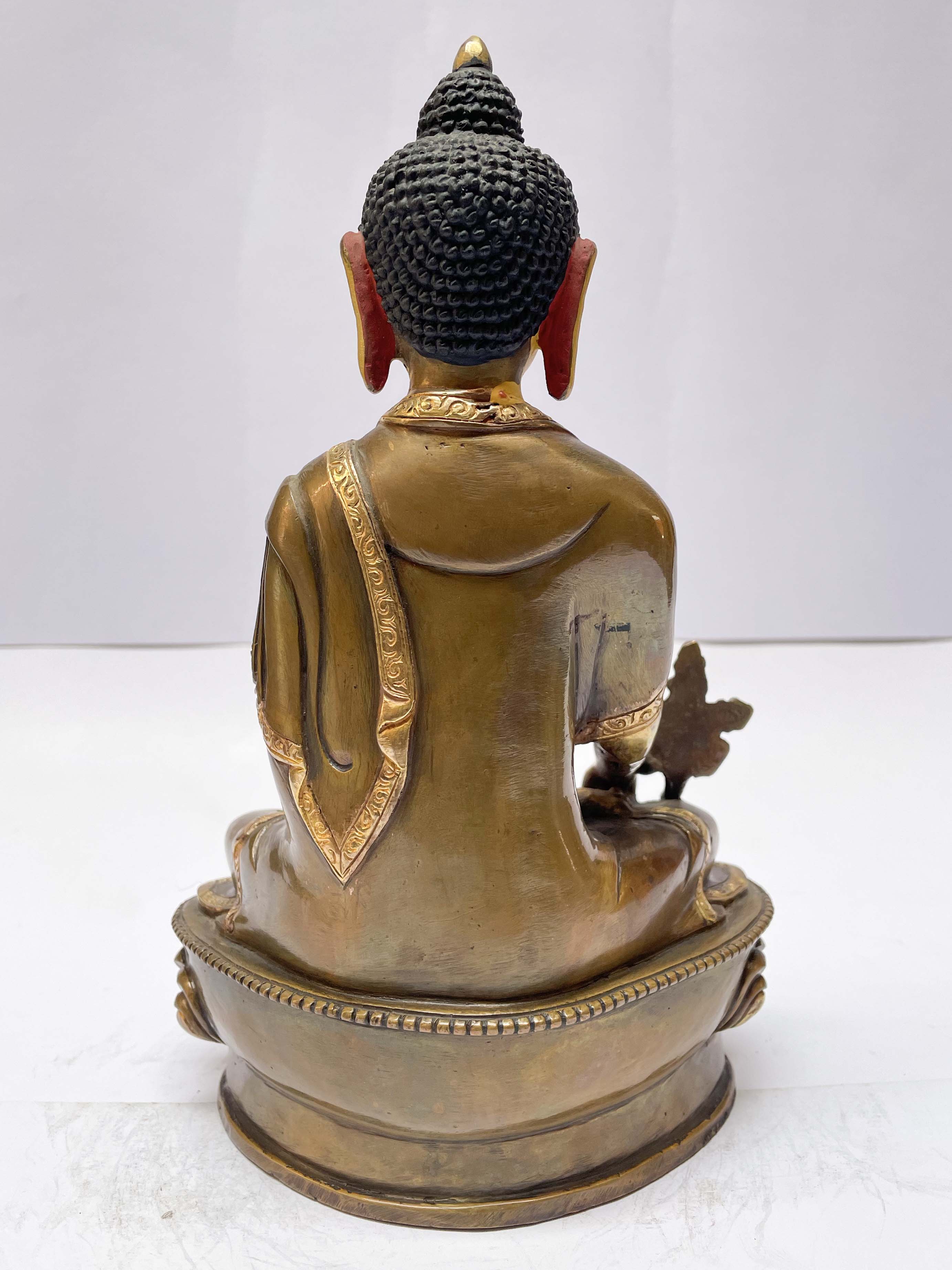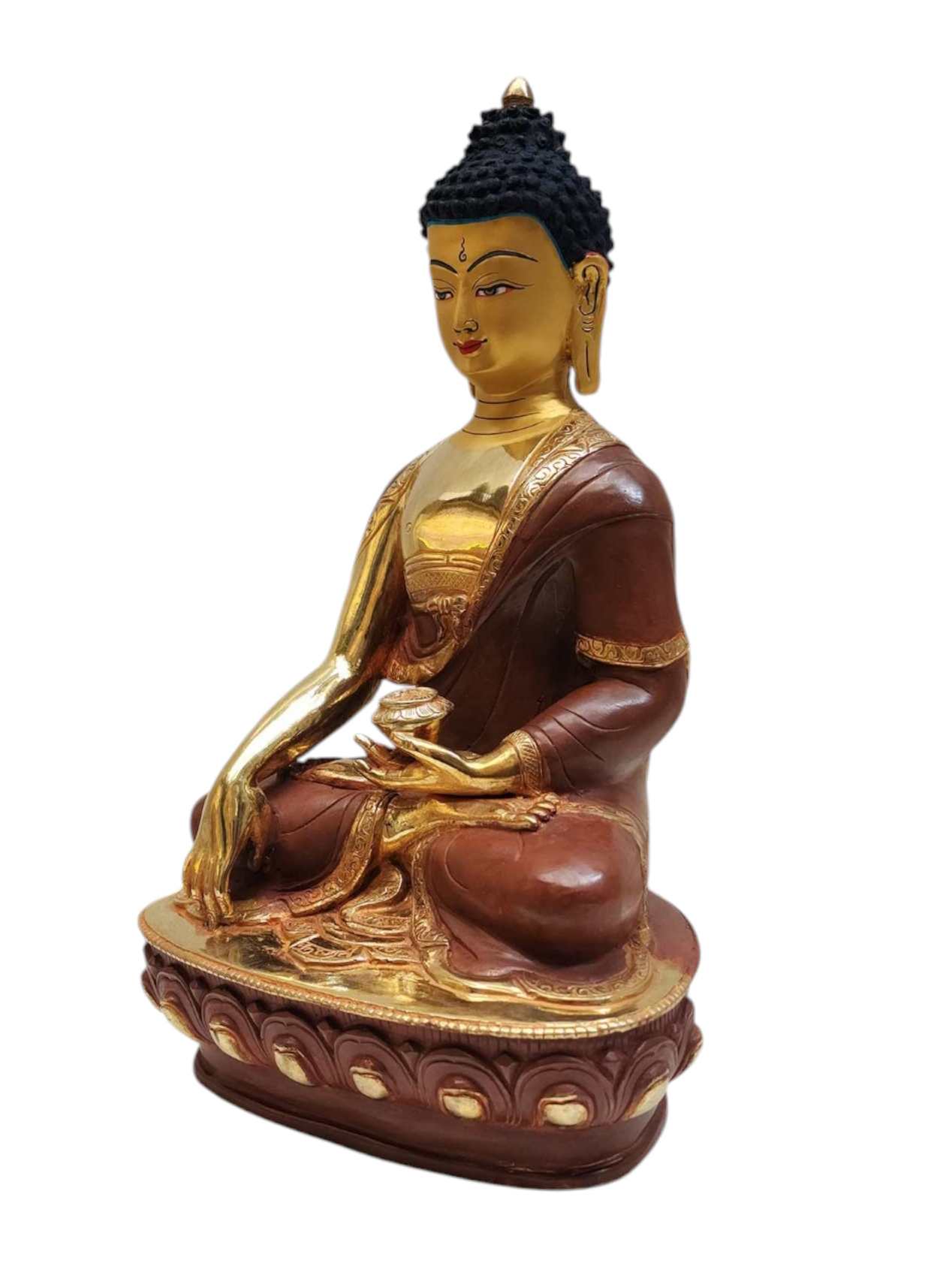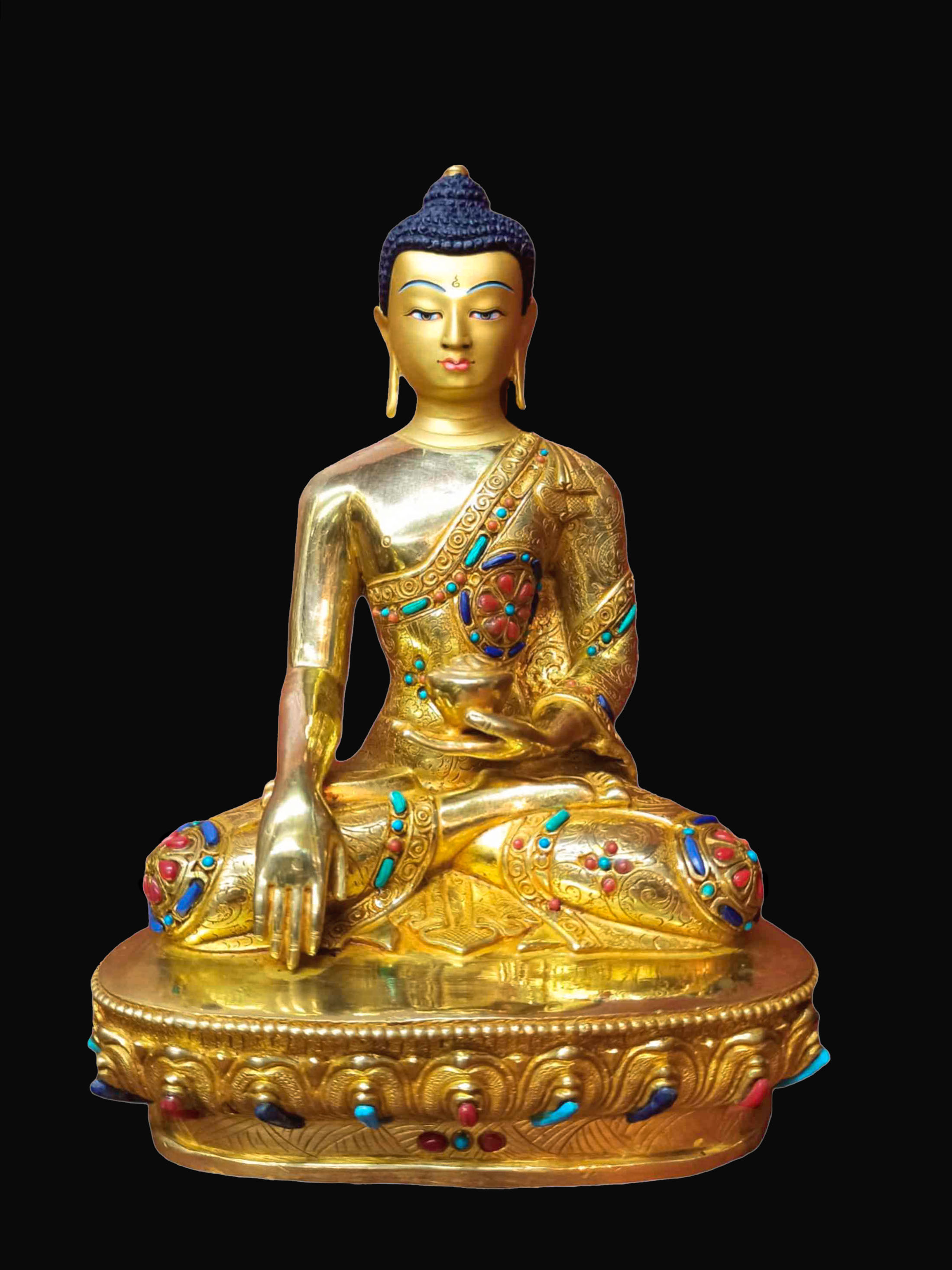Code
HCS22749
Weight
1.206 Kg / 2.66 lbs
Size
Height
21.5cm (8") Width
14cm (6") Depth
9cm (4") Material
Copper
Availability
Available
Date Added
2021-01-22 02:25:26
Note : We used to sell this product 4 years ago so it may no longer be in our stock.
It is possible that we still have it with our suppliers but the price could be different from before.
Feel free to order. We will verify availability and inform you promptly.
It is possible that we still have it with our suppliers but the price could be different from before.
Feel free to order. We will verify availability and inform you promptly.

Safe Payment
We accept Paypal, Money Transfer, Bank Transfer
Confidence
Protection covers your purchase and personal data.
Worldwide Delivery
We ship Worldwide, except Russia.Shipping cost US$25.2 for upto 0.5 kgs

Hotline
Talk to help line for your question on 9841267335Gold Painted Face
The face of Buddhist Statue Of Medicine Buddha, [partly Gold Plated], [painted Face] is painted with gold to enhance its significant features, particularly the eyes, and lips. This detailed painting is essential as it brings forth the crucial attributes of the expression of eyes and lips that metal carving alone cannot capture.
Moreover, the painted face serves as a symbolic and sacred ritual in Buddhism, preparing the statue for consecration and practice. The act of painting the face with gold in Buddhism holds deep meaning. It represents the intention to bring life and expression to the statue, imbuing it with a sense of vitality and presence. The application of gold on the face showcases the devotion and craftsmanship of the artisans, ensuring that every detail is carefully attended to honor the sacred essence of the Buddhist Statue Of Medicine Buddha, [partly Gold Plated], [painted Face]. Read More . . .
The face of Buddhist Statue Of Medicine Buddha, [partly Gold Plated], [painted Face] is painted with gold to enhance its significant features, particularly the eyes, and lips. This detailed painting is essential as it brings forth the crucial attributes of the expression of eyes and lips that metal carving alone cannot capture.
Moreover, the painted face serves as a symbolic and sacred ritual in Buddhism, preparing the statue for consecration and practice. The act of painting the face with gold in Buddhism holds deep meaning. It represents the intention to bring life and expression to the statue, imbuing it with a sense of vitality and presence. The application of gold on the face showcases the devotion and craftsmanship of the artisans, ensuring that every detail is carefully attended to honor the sacred essence of the Buddhist Statue Of Medicine Buddha, [partly Gold Plated], [painted Face]. Read More . . .
Partly Gold plating.
This Buddhist Statue Of Medicine Buddha, [partly Gold Plated], [painted Face] has a Partly gold-plated finish. Partly fire gold gilding, a common practice in Nepali handicrafts. This technique is skillfully employed by artisans to create intricate designs on various metal objects, including statues, jewelry, and decorative items. Through a process, a mask or resist is applied to safeguard specific areas from the gold plating. The object is then subjected to high temperatures, allowing the gold to beautifully adhere to exposed surfaces using a combination of heat and pressure.
In the realm of Buddhist statues, this technique holds additional significance as it distinguishes the golden-plated body from the oxidized or maroon-painted clothing. This visual separation conveys the contrast between the divine purity of the body and the modest attire symbolizing the humble lifestyle of Buddhist monks. The partly fire gold gilding not only adds exquisite detail and elegance but also embodies the deep cultural and spiritual meaning associated with these treasured artifacts. Read More . . .
This Buddhist Statue Of Medicine Buddha, [partly Gold Plated], [painted Face] has a Partly gold-plated finish. Partly fire gold gilding, a common practice in Nepali handicrafts. This technique is skillfully employed by artisans to create intricate designs on various metal objects, including statues, jewelry, and decorative items. Through a process, a mask or resist is applied to safeguard specific areas from the gold plating. The object is then subjected to high temperatures, allowing the gold to beautifully adhere to exposed surfaces using a combination of heat and pressure.
In the realm of Buddhist statues, this technique holds additional significance as it distinguishes the golden-plated body from the oxidized or maroon-painted clothing. This visual separation conveys the contrast between the divine purity of the body and the modest attire symbolizing the humble lifestyle of Buddhist monks. The partly fire gold gilding not only adds exquisite detail and elegance but also embodies the deep cultural and spiritual meaning associated with these treasured artifacts. Read More . . .
Lost-Wax System
This Buddha of Buddhist Statue Of Medicine Buddha, [partly Gold Plated], [painted Face] is made by the process of the Lost Wax system. This is a very complicated, time consuming and historic process of making metal sculptures.Which is why it is sometimes called Precision Casting as well. Hence the sculptures made by this process are comparatively expensive. There are many new, advanced and less time consuming methods of casting metal sculptures available as well. But due to the benefits provided by the traditional lost wax system in quality control and customization, we prefer the Loss wax system over Ceramic molding, or sand casting to make our Buddha.
Below we have tried to illustrate the process of making a loss wax system statue: Read More . . .
This Buddha of Buddhist Statue Of Medicine Buddha, [partly Gold Plated], [painted Face] is made by the process of the Lost Wax system. This is a very complicated, time consuming and historic process of making metal sculptures.Which is why it is sometimes called Precision Casting as well. Hence the sculptures made by this process are comparatively expensive. There are many new, advanced and less time consuming methods of casting metal sculptures available as well. But due to the benefits provided by the traditional lost wax system in quality control and customization, we prefer the Loss wax system over Ceramic molding, or sand casting to make our Buddha.
Below we have tried to illustrate the process of making a loss wax system statue: Read More . . .
Brief Introduction :
Bhaisajyaguru is known as the Medicine Buddha. He is also called the Healing Buddha. It is said that he dispenses spiritual medicine when properly worshipped. There is even a belief that an efficacious cure may be accomplished by merely touching his image. In Tibet, he may be represented either as a Buddha or as a Bodhisattva. As a Buddha, he exhibits the urn (a small round bulge or protuberance above the bridge of the nose), which is the fourth superior mark of a Buddha, and the Ushnisha (a bulge or protuberance on the top of the Buddha's skull), which is the first superior mark of a Buddha. He has short and curly hair, wears a monastic robe, and is seated with his legs crossed. His left hand, lying in his lap in a meditation mudra, usually holds the medicine bowl, while his right hand, in a charity mudra, holds either a branch with fruit or the fruit alone of the myrobalan, a medicinal plant found in India and other tropical countries.
Iconography :Medicine Buddha is the popular term for Bhaisajyaguru and refers to healing blue light transmitted by his representation and conception. Bhaisajyaguru means "Master of Blue Light". His healing energy is transmitted through blue light wave length called Vaydurya light. Medicine Buddha radiates this healing energy. Think of the light as internal chakra energy. The colour blue has been known for its purifying properties since ancient times and the deep blue colour of the Medicine Buddha is directly associated with this blue Vaydurya light energy. The energy source originates in the transparent beryl crystal bowl the Medicine Buddha supports and manifests itself in the deep blue of Lapis Lazuli [Lapis] of his corporeal body. The goldenergy lines [Skt. Chritrini] of his psychic body link all the yogic "vital airs" or energy winds [Skt. Vayus] and form the Beryl healing light energy beryl blue band of the inner aureole representing all the vital airs [Skt. Vyana] of the subtle body [Skt. Pranamayakosha]. As we journey through life we can find ourselves suffering through illness or through the illness of someone else. During illness previous priorities seem almost irrelevant as we seek to restore our balance or to find a new balance in our lives. Suddenly the medicine Buddha who is often overlooked becomes the most important of all while we realise our oversight. The image of the medicine Buddha can be used as a meditation deity [Skt. Ishta-devata] texts often call a meditation deity a Tutelary Deity or a Yidam Deity. A Yidam is the Tibetan word for an Ishtar-devata, a fully enlightened being who is the focus of personal meditation, during a retreat or for life. Deity Yoga practices can be undertaken. In essence, the mindstream of the guru and the yidam are indivisible. The yidam is considered to be the root of success in the practice. Visualise his serenity & healing light.
His extended left hand with an open front palm is shown in gift bestowing [Skt. Varada] hand gesture [Skt. Mudra] and holds the stem of a triple fruited myrobalan plant between his thumb & forefinger. In Tibetan medicine the myrobalan plant is known as the 'King of Medicines' on account of its medicinal properties. The gift bestowing hand gesture represents his dispensing of healing and holds a myrobalan plant bearing three myrobalan fruits. The number three refers to Principle of Three Gunas, which are Energy [Skt. Rajas] Inertia/Movement [Skt. Tamas] & wholeness or bodily order [Skt. Sattwa] When balanced we enjoy good health, when unbalanced illness can arise. Our bodies have a remarkable ability to rebalance if we allow them in a process known as homeostasis, directly linked to the principle of the Gunas. Unbalancing can occur when the moon residing at the naval root absorbs too much form the sun at the palette root which relates to too much sensual indulgence with the and the nectar of the moon is.
The right hand of Medicine Buddhas rests upon his lap in the position associated with an advanced connection with the inner self arrived at through meditation, commonly called the meditative state. The same hand supports a blue beryl crystal alms bowl containing medicinal nectar and a myrobalan fruit. He is portrayed wearing maroon monastic robes painted seated on a white moon disc in a lotus body position [Skt. Padmasana] and upon an actual lotus flower. Magical Buddhism [Tantric Buddhism] is very connected with Although more commonly linked to Vedic Yoga.
Commentary :His extended left hand with an open front palm is shown in gift bestowing [Skt. Varada] hand gesture [Skt. Mudra] and holds the stem of a triple fruited myrobalan plant between his thumb & forefinger. In Tibetan medicine the myrobalan plant is known as the 'King of Medicines' on account of its medicinal properties. The gift bestowing hand gesture represents his dispensing of healing and holds a myrobalan plant bearing three myrobalan fruits. The number three refers to Principle of Three Gunas, which are Energy [Skt. Rajas] Inertia/Movement [Skt. Tamas] & wholeness or bodily order [Skt. Sattwa] When balanced we enjoy good health, when unbalanced illness can arise. Our bodies have a remarkable ability to rebalance if we allow them in a process known as homeostasis, directly linked to the principle of the Gunas. Unbalancing can occur when the moon residing at the naval root absorbs too much form the sun at the palette root which relates to too much sensual indulgence with the and the nectar of the moon is.
The right hand of Medicine Buddhas rests upon his lap in the position associated with an advanced connection with the inner self arrived at through meditation, commonly called the meditative state. The same hand supports a blue beryl crystal alms bowl containing medicinal nectar and a myrobalan fruit. He is portrayed wearing maroon monastic robes painted seated on a white moon disc in a lotus body position [Skt. Padmasana] and upon an actual lotus flower. Magical Buddhism [Tantric Buddhism] is very connected with Although more commonly linked to Vedic Yoga.
This is why the ideas in Patanjali's Yoga Sutra are so closely connected with the Buddhist Principle of The Four Noble Truths and on gaining the liberated path. There are many other connections with Yoga such as the tantric gold energy lines [Skt. Chitrini] the lotus and chakras and in the choice of colours of aureoles. Perhaps most obvious is the classic yoga lotus asana with one leg crossed over the other that the Medicine Buddha is sitting in. The wisdom of Devata Yoga will help.
Matra of Medicine Buddha
namo bhagavate bhaiśajyaguru vaidūryaprabharājāya tathāgatāya arhate samyaksambuddhāya tadyathā: oṃ bhaiśajye bhaiśajye bhaiśajya-samudgate svāhā.


![Buddhist Statue Of Medicine Buddha, [partly Gold Plated], [painted Face]](https://handicraftseller.com/uploads/pics/product/thumb/2021/01/22749.jpg)
![Buddhist Statue Of Medicine Buddha, [partly Gold Plated], [painted Face]](https://handicraftseller.com/uploads/pics/product/thumb/2021/01/22749_0.jpg)
![Buddhist Statue Of Medicine Buddha, [partly Gold Plated], [painted Face]](https://handicraftseller.com/uploads/pics/product/thumb/2021/01/22749_1.jpg)
![Buddhist Statue Of Medicine Buddha, [partly Gold Plated], [painted Face]](https://handicraftseller.com/uploads/pics/product/thumb/2021/01/22749_2.jpg)


























































 of Shakyamuni Buddha,
of Shakyamuni Buddha,  of Shakyamuni Buddha,
of Shakyamuni Buddha,  Best Price, Amitabha Buddha Statue,
Best Price, Amitabha Buddha Statue,  Best Price, Amitabha Buddha Statue,
Best Price, Amitabha Buddha Statue,  Shakyamuni Buddha, Tibetan Buddhist Handmade Statue, Partly Gold Plated, Painted Face" title="
Shakyamuni Buddha, Tibetan Buddhist Handmade Statue, Partly Gold Plated, Painted Face" title=" Shakyamuni Buddha, Tibetan Buddhist Handmade Statue, Partly Gold Plated, Painted Face" title="
Shakyamuni Buddha, Tibetan Buddhist Handmade Statue, Partly Gold Plated, Painted Face" title=" Shakyamuni Buddha, Buddhist Handmade Statue,
Shakyamuni Buddha, Buddhist Handmade Statue,  Shakyamuni Buddha, Buddhist Handmade Statue,
Shakyamuni Buddha, Buddhist Handmade Statue,  of Shakyamuni Buddha,
of Shakyamuni Buddha,  Face Painted,
Face Painted,  Face Painted,
Face Painted,  Chocolate Oxidized,
Chocolate Oxidized,  Best Price, Shakyamuni Buddha,
Best Price, Shakyamuni Buddha,  Best Price, Shakyamuni Buddha,
Best Price, Shakyamuni Buddha,  Chocolate Oxidized,
Chocolate Oxidized,  Shakyamuni Buddha, Buddhist Handmade Statue,
Shakyamuni Buddha, Buddhist Handmade Statue,  Shakyamuni Buddha, Buddhist Handmade Statue,
Shakyamuni Buddha, Buddhist Handmade Statue,